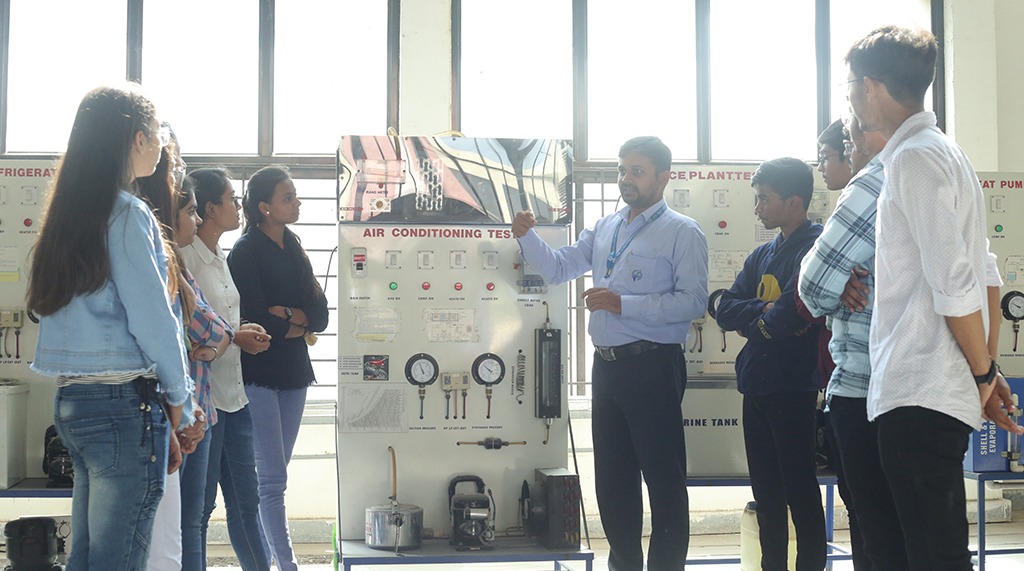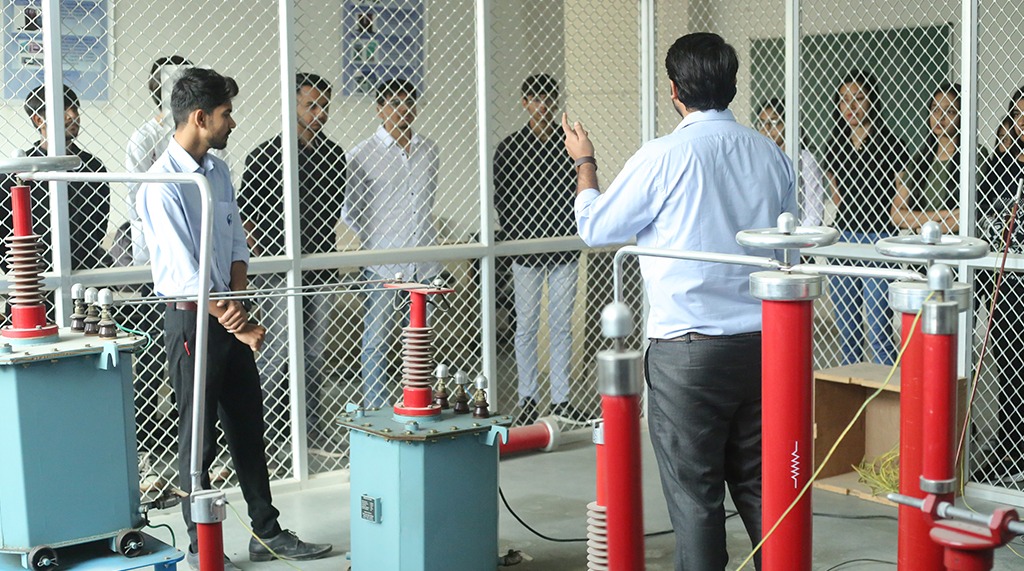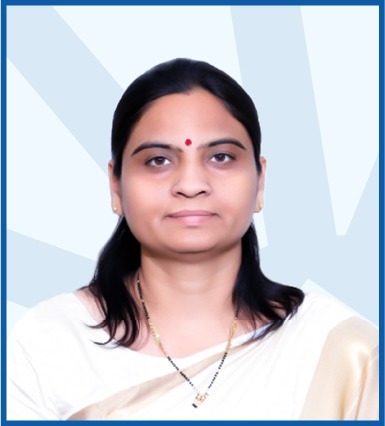Electronics and Communication Engineering
Powering Tomorrow’s Communication Network at the Best Private University in Junagadh
Latest News and Events
Result Declaration – B.Tech Sem 2 Remedial Exam (Winter 2023)
Results for the Remedial Examinations of B.Tech Semester 2, held during Winter 2023, have been declared.
Result Notification – B.Tech Sem – 3 (Regular), M.Tech, Diploma Sem – 2 (Remedial) and BCA Sem – 1 (Remedial) Winter 2023-24
Result Notification - B.Tech Sem - 3 (Regular), M.Tech, Diploma Sem - 2 (Remedial) and BCA Sem - 1 (Remedial) Winter 2023-24
Design & development of PV solar power plant
Electrical and EC department is going to organize two two-day hands-on workshop on the Design & development of PV solar power plants.
Introduction to course
In this 21st century, every day we are dealing with the electronic circuits and devices in some or the other forms because gadgets, home appliances, computers, transport systems, cell phones, cameras, TV, etc. all have electronic components and devices. Today’s world of electronics has made deep inroads in several areas, such as healthcare, medical diagnosis, automobiles, industries, electronics projects etc. and convinced everyone that without electronics, it is really impossible to work. The rapid development that is taking place world over in new technology areas like IoT, Artificial Intelligence, and Robotics have placed greater demand for electronics and communication engineers in days to come.
Department of Electronics & Communication Engineering was established in the year 2010 by offering a Bachelor’s Degree Course in Electronics & Communication Engineering.The major goal of the Department of Electronics and Communication Engineering is to produce highly knowledgeable, competent and resourceful young engineers who can perform well in a wide variety of job profiles.It also provides ample opportunities to students to work on mini-projects, develop communication skills, explore internship opportunities in industry and world-class universities and take part in national and international design contests.To achieve this, Department has well qualified, experienced and dedicated faculties providing excellent teaching & learning environment. Department team is committed to work toward providing quality education through innovative teaching and learning processeswith industrial background to bridge the gap between academic learning and industrial needs.
Mission
- To deliver a comprehensive and forward-thinking curriculum that integrates fundamental electrical engineering principles with modern technologies, empowering students to thrive in a dynamic global environment.
- To nurture a culture of creativity, interdisciplinary research, and problem-solving to address real-world challenges in energy, automation, and emerging electrical technologies for societal benefit.
- To build robust collaborations with industry and communities, enabling practical learning, entrepreneurship, and the development of sustainable engineering solutions.
- To uphold the highest standards of ethics, integrity, and social responsibility, fostering transparency, accountability, and respect in all departmental pursuits.
Vision
To be a premier department in electrical engineering education and research,
fostering innovation and excellence to address societal and technological challenges
while contributing to sustainable development

Course objective
To impart quality education to the students so that they acquire knowledge in Electronics and Communication Engineering and be successful in their professional career. To develop the ability among students to analyze real life problems & design cost-effective feasible solutions for humanity in the field of Electronics and Communication Engineering. To promote students’ awareness of lifelong learning through an excellent academic environment, prepare them for higher education and provide them opportunity to work in teams on multidisciplinary research and development activities. To impart the knowledge of theory and practices of Electronics and Communication and its applications in areas of modern research and current industry trends to the students. To improve the communication skills of students, prepare them to acquire good leadership skills to lead a team and good interpersonal relationship for working in a team.
Course outcome
The graduates of Electronics & Communication engineering will be able to:
- Apply principles of analog and digital electronic circuit design and develop efficient electronic circuits meeting specified design objectives
- Design creative approach in application of electronics devices, equipment and systems
- Identify, analyze and solve problems related to VLSI design, power electronics, signal processing and communication engineering.
- Ability to demonstrate skills to use modern engineering tools, software’s and equipment to analyze problems
- Ability to apply contextual knowledge relevant to Electronics and communication engineering practices.
- Design solutions for complex engineering problems and design system components or processes that meet the specified needs with appropriate consideration for the public health and safety, and the cultural, societal, and environmental considerations.
- Apply ethical principles and commit toprofessional ethics and responsibilities and norms of theengineering practice.
- Use research-based knowledge and research methods including design of experiments, analysis and interpretation of data, and synthesis of the information to provide valid conclusions.
- Recognize the need for, and have the preparation and ability to engage in independent and life-long learning in the broadest context of technological change.
Admission procedure
Eligibility:
- The student who has qualified HSC or equivalent examination in Science stream from recognized board or body is eligible for admission in B.Tech. programme.
|
Board |
Category |
Theory Marks |
Theory + Practical Marks |
|---|---|---|---|
|
GSEB |
Open |
135 / 300 |
180 / 400 |
|
GSEB |
Reserve |
120 / 300 |
180 / 400 |
|
Other Boards |
Open |
108 / 240 |
135 / 300 |
|
Other Boards |
Reserve |
96 / 240 |
120 / 300 |
Admission Process:
- Purchase a PIN and Booklet from the recognized bank as informed by the Admission Committee.
- Submit an online form with necessary details and upload the documents on the admission portal.
- Make suitable choice filling as suggested by the admission committee in due time.
- Once the seat allocation is done and a seat is allotted to you, confirm your admission and pay necessary fees online on the portal.
- Take print of confirmation letter and payment receipt and report to the allotted institute in prescribed time duration.
Curriculum
- Duration: 4 years
- Fees: Rs. 77,175
- Intake: 30
| GTU Code | Subject | Theory(Hrs) | Tutorial(Hrs) | Practical(Hrs) | Credits |
|---|---|---|---|---|---|
| 3110014 | Mathematics-I | 0 | 0 | 0 | 0 |
| 3110011 | Physics Group - I | 3 | 0 | 2 | 4 |
| 3110005 | Basic Electrical Engineering | 3 | 0 | 2 | 4 |
| 3110013 | Engineering Graphics & Design | 3 | 0 | 2 | 4 |
| 3110006 | Basic Mechanical Engineering | 3 | 0 | 2 | 4 |
| GTU Code | Subject | Theory(Hrs) | Tutorial(Hrs) | Practical(Hrs) | Credits |
|---|---|---|---|---|---|
| 3110002 | English | 2 | 0 | 2 | 3 |
| 3110003 | Programming for Problem Solving | 3 | 0 | 2 | 4 |
| 3110007 | Environmental Science | 2 | 2 | 0 | 0 |
| 3110012 | Workshop | 0 | 0 | 4 | 23110015 |
| 3110015 | Mathematics-II | 3 | 2 | 0 | 5 |
| 3110016 | Basic Electronics | 3 | 0 | 2 | 5 |
| GTU Code | Subject | Theory(Hrs) | Tutorial(Hrs) | Practical(Hrs) | Credits |
|---|---|---|---|---|---|
| 3130004 | Effective Technical Communication | 2 | 0 | 2 | 3 |
| 3130006 | Probability and Statistics | 3 | 2 | 0 | 5 |
| 3130007 | Indian Constitution | 2 | 0 | 0 | 0 |
| 3131101 | Control Systems | 3 | 0 | 2 | 4 |
| 3131102 | Digital System Design | 4 | 0 | 2 | 5 |
| 3131103 | Network Theory | 4 | 0 | 2 | 5 |
| 3130008 | Design Engineering - I A | 0 | 0 | 2 | 1 |
| GTU Code | Subject | Theory(Hrs) | Tutorial(Hrs) | Practical(Hrs) | Credits |
|---|---|---|---|---|---|
| 2140002 | Design Engineering - I B | 0 | 0 | 3 | 3 |
| 2140304 | Microprocessor and Interfacing | 4 | 0 | 2 | 6 |
| 2141002 | Analog Circuit Design | 4 | 0 | 2 | 6 |
| 2141003 | Electronics Measurement and Instrumentation | 3 | 0 | 2 | 5 |
| 2141004 | Control System Engineering | 4 | 0 | 2 | 6 |
| 2141005 | Signals and Systems | 3 | 0 | 2 | 5 |
| 2141006 | Simulation and Design Tools | 0 | 0 | 2 | 2 |
| GTU Code | Subject | Theory(Hrs) | Tutorial(Hrs) | Practical(Hrs) | Credits |
|---|---|---|---|---|---|
| 2150001 | Design Engineering - II A | 0 | 0 | 3 | 3 |
| 2150002 | Cyber Security (Inst. Elec.) | 0 | 1 | 2 | 3 |
| 2150003 | Disaster Management (Inst. Elec.) | 3 | 0 | 0 | 3 |
| 2151001 | Microcontroller and Interfacing | 4 | 0 | 2 | 6 |
| 2151002 | Engineering Electromagnetics | 4 | 0 | 2 | 6 |
| 2151004 | Electronic and Communication | 4 | 0 | 2 | 6 |
| 2151101 | Audio Video Systems | 3 | 0 | 2 | 5 |
| 2151102 | Mini Project | 0 | 0 | 2 | 2 |
| GTU Code | Subject | Theory(Hrs) | Tutorial(Hrs) | Practical(Hrs) | Credits |
|---|---|---|---|---|---|
| 2160001 | Design Engineering - II B | 0 | 0 | 3 | 3 |
| 2161001 | Digital Communication | 4 | 0 | 2 | 6 |
| 2161003 | Antenna and Wave Propagation | 4 | 0 | 2 | 6 |
| 2161005 | Optical Communication (Dept Elec-I) | 4 | 0 | 2 | 6 |
| 2161006 | Power Electronics Devices and Circuits (Dept Elec-I) | 3 | 0 | 2 | 5 |
| 2161101 | VLSI Technology and Design VLSI TechnI Technology and Design ology and Design | 4 | 0 | 2 | 6 |
| 2161102 | Advanced Microprocessor (Dept Elec-I) | 3 | 0 | 2 | 5 |
| 2161103 | Telecommunication Switching Systems and Networks (Dept Elec-I) | 4 | 0 | 2 | 6 |
| GTU Code | Subject | Theory(Hrs) | Tutorial(Hrs) | Practical(Hrs) | Credits |
|---|---|---|---|---|---|
| 2170001 | Project | 0 | 0 | 4 | 4 |
| 2171001 | Microwave Engineering | 4 | 0 | 2 | 6 |
| 2171003 | Digital Signal Processing (Dept Elec-II) | 4 | 0 | 2 | 6 |
| 2171004 | Wireless Communication | 4 | 0 | 2 | 6 |
| 2171005 | Embedded Systems (Dept Elec-II) | 3 | 0 | 2 | 5 |
| 2171007 | Satellite Communication (Dept Elec-II) Satellite Communication (Dept Elec-II) Satellite Communicati | 3 | 0 | 2 | 5 |
| 2171008 | Data Communication and Networking (Dept Elec-II) | 3 | 0 | 2 | 5 |
| 2171102 | Biomedical Instrumentation (Dept Elec-II) | 3 | 0 | 2 | 5 |
| 2171103 | Industrial Automation (Dept Elec-II) | 3 | 0 | 2 | 5 |
| GTU Code | Subject | Theory(Hrs) | Tutorial(Hrs) | Practical(Hrs) | Credits |
|---|---|---|---|---|---|
| 2181102 | Fundamentals of Image Processing (Dept Elec - III) | 4 | 0 | 2 | 6 |
| 2181103 | Radar & Navigational Aids (Dept Elec - III) | 4 | 0 | 2 | 6 |
| 2181105 | Project II | 0 | 0 | 24 | 24 |
| 2181106 | Device Driver & Writing (Dept Elec - III) | 4 | 0 | 2 | 6 |
| 2181107 | Testing And Verification (Dept Elec - III) | 4 | 0 | 2 | 6 |
Labs and facilities





